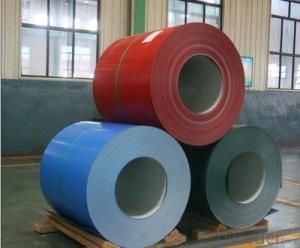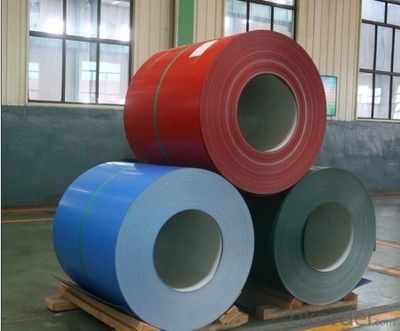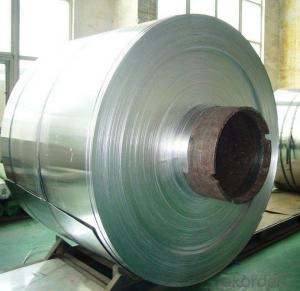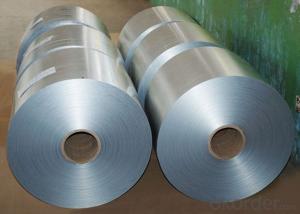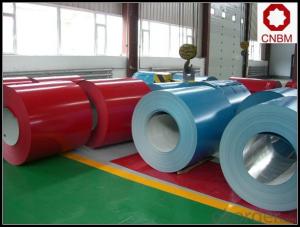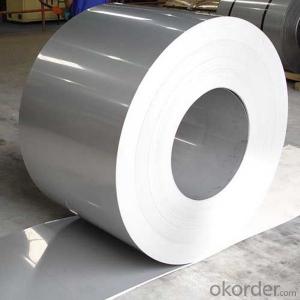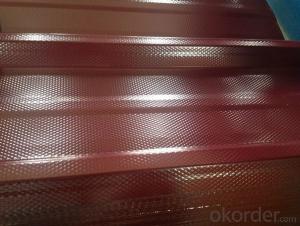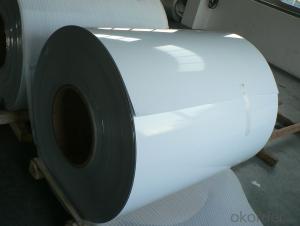Rona Aluminum Coil - Coated Aluminum Coils 3003 H14 for Metal Walls
- Loading Port:
- Shanghai
- Payment Terms:
- TT OR LC
- Min Order Qty:
- 5 m.t.
- Supply Capability:
- 10000 m.t./month
OKorder Service Pledge
OKorder Financial Service
You Might Also Like
Specification
1. Structure of Coated Aluminium Coils 3003 H14 for Metal Walls Description
• Product: Aluminim coils
• Application:
corrugated roofs, outer walls, ovens, electrically controlled cabinets.
household appliances, transportation, base plate, color coating.
industrial freezers in the residential and industrial buildings.
refrigerator backplane, gas stove, air conditioner, microwave, LCD border.
• Advantage: Full production line with all kinds of coils supply
2. Main Features of the Coated Aluminium Coils 3003 H14 for Metal Walls
• Our goods quality is top, the surface is smooth, and every steel coil
• No Joint, No Bends, no spots, no roller marks.
• MTC will be provided with goods, third part inspection is acceptable, for example, SGS, BV. Etc
3. Coated Aluminium Coils 3003 H14 for Metal Walls Images
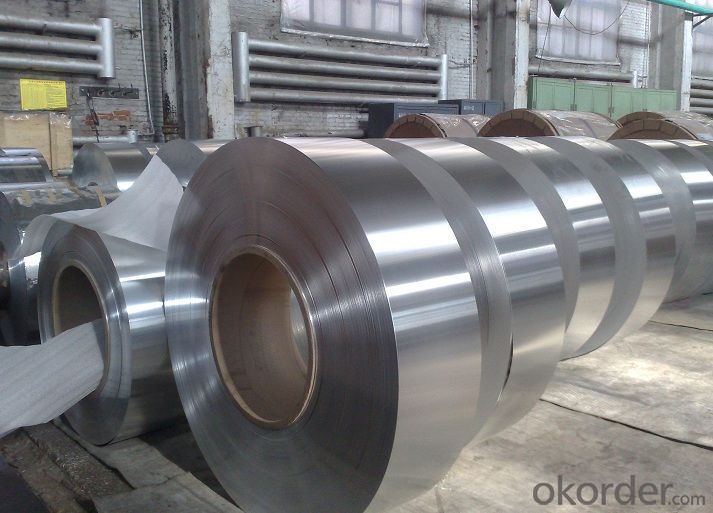
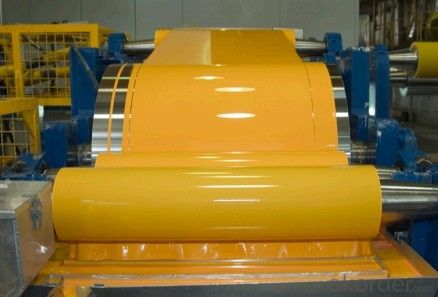
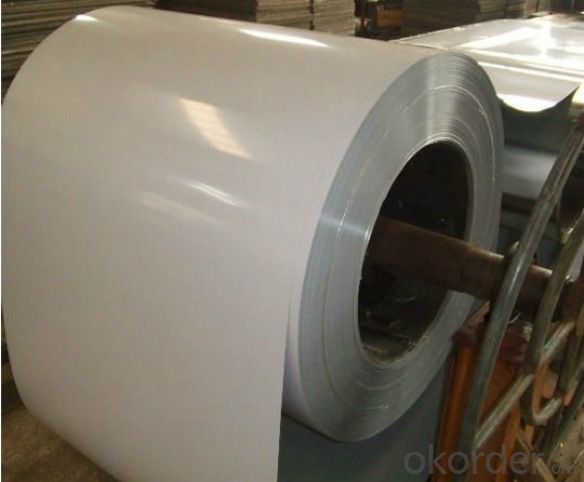
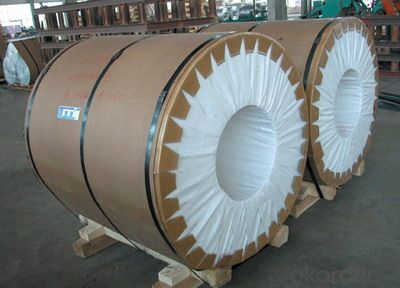
4. Coated Aluminium Coils 3003 H14 for Metal Walls Specification
Alloy | AA1050/1100/3003/3005/3105/5005/5052 etc |
Thickness | 0.03mm—4.0mm |
Width | 10mm—1600mm |
Coating | PVDF, PE |
Coatingthickness | Usually16-25 micron, could be 33-40 micron |
Color | According to Ral |
Standard | ASTM-B 209 GB/3008-2006 |
Usage/ApplicationsCoated Aluminum Coil/Sheet | Constructionand decoration, electronic appliances, lighting decoration, air-condition airpipe, sandwich panels and drainage, etc |
5.FAQ of Coated Aluminium Coils 3003 H14 for Metal Walls
We have organized several common questions for our clients,may help you sincerely:
① How about your company?
A world class manufacturer & supplier of aluminum coil and alloy blanks. Aluminum production base is comprised of 18 aluminum annealers, 10 coil and foil mills, 4 continuous production lines, 2 hot rolling production line and 3 prepainted lines.
Export 5000 tons per month to Asia, America and Middle East. Always do the best for our clients.
②Can you guarantee the quality of the products?
We are responsible for the quality of materials to get a long-term cooperation with clients in a reasonable period of time and we are glad to arrange and coordinate any third party inspection for you.
③What is the delivery time after purchase?
35 day after receiving client’s deposit or correct LC
- Q: Can aluminum coils be customized in terms of thickness?
- Yes, aluminum coils can be customized in terms of thickness. The thickness of aluminum coils can be adjusted according to the specific requirements of a particular application. This customization is achieved through a process called aluminum coil slitting, where the original coil is cut into narrower coils of desired thickness. This allows for flexibility in meeting various needs and specifications of different industries.
- Q: What are the steps to properly store an unused aluminum coil to prevent it from rusting?
- <p>To store an unused aluminum coil and prevent rusting, follow these steps: 1. Clean the coil thoroughly to remove any dirt or moisture. 2. Apply a thin layer of a rust inhibitor or light oil to the surface. 3. Wrap the coil in a protective plastic or wax paper to prevent moisture and air exposure. 4. Store the coil in a cool, dry place away from direct sunlight and humidity. 5. Ensure the storage area is well-ventilated to prevent condensation. 6. Periodically check the coil for any signs of rust and clean if necessary. By following these steps, you can effectively prevent rusting and maintain the quality of the aluminum coil.</p>
- Q: What are the uses of aluminum coils?
- Aluminum coils have a wide array of applications in various industries. HVAC systems and air conditioning units heavily rely on aluminum coils for their heat transfer and air cooling functions. These coils are indispensable components in these systems. Moreover, the construction industry frequently utilizes aluminum coils for roofing, cladding, and insulation purposes. Their lightweight nature, durability, and resistance to corrosion make them perfect for outdoor applications. The automotive industry also incorporates aluminum coils in the production of vehicles. These coils are used in the manufacturing of various parts, including radiators, heat exchangers, and condensers, owing to their exceptional heat transfer properties. The packaging industry extensively depends on aluminum coils as well. These coils are employed in the production of cans and containers for food and beverages. Aluminum is an excellent choice for packaging due to its lightweight nature, recyclability, and ability to provide a barrier against moisture, oxygen, and light. This ensures the quality and freshness of the enclosed products. Furthermore, aluminum coils find applications in electrical wiring, where they serve as conductors due to their high electrical conductivity. They are also used in the production of electronics like laptops, smartphones, and tablets, as they possess excellent heat dissipation properties. In conclusion, the uses of aluminum coils span across a diverse range of industries, including HVAC systems, construction, automotive, packaging, and electrical applications. The versatility, durability, and exceptional properties of aluminum make it a favored material choice in numerous sectors.
- Q: Is aluminium a safe metal to put in ones mouth without any side effects?
- I just saw a post on Facebook to whiten your teeth....just like professionals. Put salt,baking soda, and toothpaste mixed together. Spread on teeth. Wrap aluminum foil over teeth and let set. So I'm wondering if the aluminum foil at this point leeches into your mouth???
- Q: This question asks about potential safety hazards when using electric heaters that have aluminum coils.
- <p>While electric heaters with aluminum coils are generally safe when used properly, there are some safety concerns to consider. Aluminum can heat up quickly and may become very hot, posing a risk of burns if touched. Additionally, aluminum coils can corrode over time, potentially leading to electrical shorts or fires. It's important to ensure that the heater is not covered or obstructed, as this can cause overheating. Always follow the manufacturer's instructions for use and safety precautions. Regularly inspect the heater for any signs of damage or wear, and never use a heater with a damaged cord or plug.</p>
- Q: What are the surface treatment options for aluminum coils?
- There are several surface treatment options available for aluminum coils, depending on the specific requirements and desired outcomes. Some common options include: 1. Anodizing: This is a widely used treatment method that involves creating a protective oxide layer on the surface of the aluminum coil. Anodizing provides corrosion resistance, improves durability, and allows for color customization through dyes. 2. Painting: Aluminum coils can be coated with various types of paint to enhance their appearance, provide additional protection against corrosion, and improve resistance to UV radiation. Both liquid and powder coatings are available, with different finishes and levels of durability. 3. Coil coating: This is a continuous process where a coating material is applied to the aluminum coil's surface. The coil is then cured, resulting in a uniform and durable coating. This treatment option offers a wide range of finishes, colors, and special effects. 4. Laminating: By applying a protective film or sheet onto the surface of the aluminum coil, laminating can enhance its resistance to scratches, abrasion, and chemicals. This treatment is often used in applications where the coil may come into contact with harsh environments. 5. Brushing or polishing: These mechanical treatments can give the aluminum coil a desired texture, such as a brushed or mirror-like finish. Brushing creates a pattern of parallel lines, while polishing results in a highly reflective, smooth surface. 6. Chemical conversion coatings: These coatings are typically applied as a pre-treatment before painting or as a standalone treatment. They enhance corrosion resistance and provide a base for subsequent coatings, such as paint or powder coating. These are just a few examples of the surface treatment options available for aluminum coils. The choice of treatment will depend on factors such as the desired appearance, level of corrosion resistance, durability, and the specific application requirements.
- Q: Can aluminum coils be anodized for enhanced durability?
- Indeed, it is possible to anodize aluminum coils in order to enhance their durability. Anodization involves the creation of a layer of aluminum oxide on the surface of the aluminum, resulting in increased resistance to corrosion, wear, and scratches. This layer also offers added protection against UV rays and harsh environmental conditions. By subjecting aluminum coils to anodization, they become more resilient and capable of enduring extended use in a variety of industries, including construction, automotive, and electronics. Moreover, anodized aluminum coils can be further enhanced with additional coatings or finishes to improve their appearance and provide additional protection. Overall, anodizing aluminum coils is a widely employed and efficacious technique for boosting their durability and extending their lifespan.
- Q: Are aluminum coils resistant to saltwater corrosion?
- Generally, aluminum coils exhibit resistance to corrosion caused by saltwater. Aluminum is widely recognized for its exceptional corrosion resistance, particularly in marine settings where exposure to saltwater is common. The naturally occurring oxide layer on the surface of aluminum acts as a shield, effectively preventing direct contact between the aluminum and the corrosive saltwater. This oxide layer serves as a protective barrier against saltwater corrosion. Moreover, various coating techniques, such as anodizing or painting, can be employed to further enhance the resistance of aluminum coils against saltwater corrosion. Nevertheless, it is worth noting that prolonged or continuous exposure to saltwater can gradually deteriorate the protective oxide layer and potentially result in corrosion, albeit at a slow pace. To prolong the lifespan and optimize the performance of aluminum coils in saltwater environments, regular maintenance and appropriate care are essential.
- Q: What are the different color options for coated aluminum coils?
- There is a wide selection of colors available for coated aluminum coils, catering to different aesthetic preferences and project requirements. White, black, silver, gray, bronze, gold, red, blue, green, and brown are some of the commonly chosen colors for coated aluminum coils. These colors can be achieved using various coating processes and techniques, such as powder coating, PVDF coating, or polyester coating. In addition to these standard options, customers also have the opportunity to select custom colors that align with their design vision or brand identity. The versatility and flexibility of the color choices for coated aluminum coils make them suitable for a variety of applications, including building facades, roofing systems, signage, interior decoration, and more.
- Q: Classification of aluminium rolls for aluminium rolls
- The utility model has the advantages of good usability, good interface characteristics, easy coating and good processability. It can be used on low pressure weapons and aircraft joints.6061 general features: excellent interface features, easy coating, high strength, good usability, strong corrosion resistance.Typical use: 6061 aluminum aircraft parts, camera parts, couplers, ship accessories and hardware, electronic accessories and fittings, decoration or various hardware, hinge head, head, brake piston, hydraulic piston, valve and valve parts, electrical accessories.
Send your message to us
Rona Aluminum Coil - Coated Aluminum Coils 3003 H14 for Metal Walls
- Loading Port:
- Shanghai
- Payment Terms:
- TT OR LC
- Min Order Qty:
- 5 m.t.
- Supply Capability:
- 10000 m.t./month
OKorder Service Pledge
OKorder Financial Service
Similar products
Hot products
Hot Searches
Related keywords
